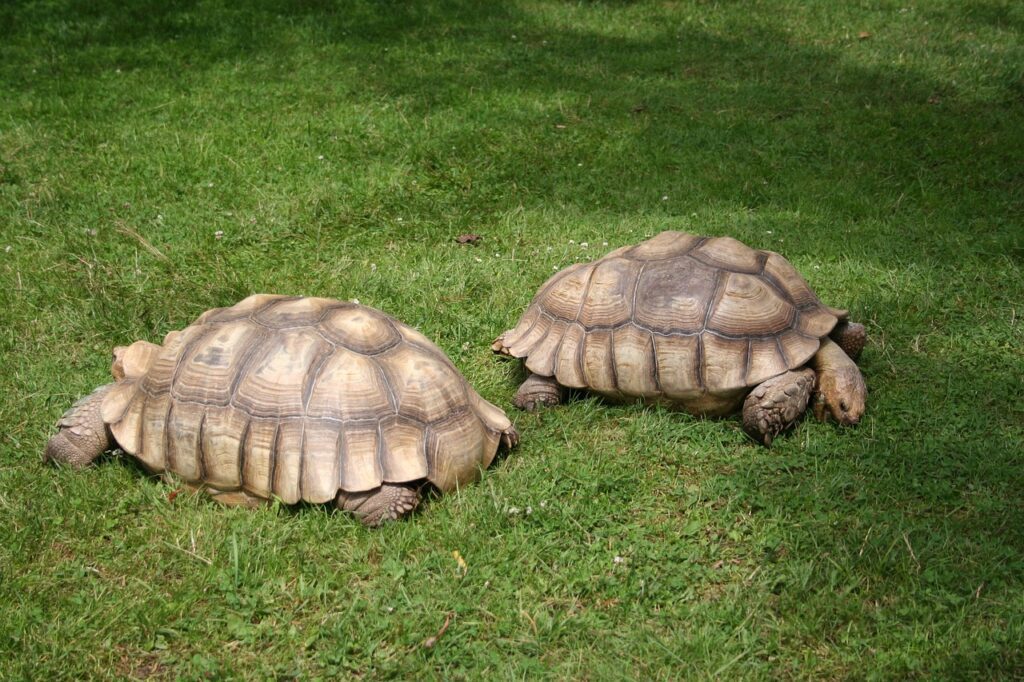Sulcata tortoises, often dubbed African spurred tortoises, are remarkable creatures that captivate the hearts of reptile enthusiasts. As pets, they have become increasingly popular due to their unique characteristics and mesmerizing demeanor. But before you adopt one, it’s important to understand their needs.
These majestic reptiles, native to the Sahel region of Africa, are known for their impressive size and longevity. Growing up to 30 inches and weighing over 100 pounds, they demand ample space and proper care. Their shells, covered in bumpy scales (scutes), make them stand out among other tortoise species.
Their lifespan is notable too – they can live well over 50 years, with the right care and attention. So if you decide to bring a sulcata tortoise into your home, it’s a lifelong commitment that should not be taken lightly.
You’ll need to provide them with an environment that looks like their natural habitat. This includes a large outdoor enclosure with access to both sunlight and shade throughout the day. Plus, they love to roam, dig burrows, and bask under the sun.
Their diet consists mainly of high-fiber grasses and leafy greens such as dandelion greens, endive, and collard greens. A calcium-rich diet is essential for their health and helps to prevent nutritional deficiencies.
It’s also worth noting that these tortoises require a great deal of time, effort, and resources to care for properly. So make sure to research and educate yourself about their needs before making the commitment.
Surprisingly, sulcata tortoises have an incredible ability to retain water within their bodies, allowing them to survive in arid environments. This unique adaptation makes them very resilient, and they can endure long periods without water sources.
Key Takeaways
- Sulcata tortoises can make good pets for the right owner. They are known for their docile nature and can be quite friendly and sociable with their owners.
- However, potential owners should be aware of the long lifespan of these tortoises. Sulcata tortoises can live for over 50 years, so it is important to be prepared for a long-term commitment.
- These tortoises also require a large and secure outdoor enclosure, as they need plenty of space to roam and graze. Providing a suitable habitat is crucial for their well-being.
- Sulcata tortoises have specific dietary needs, and their diet should consist mainly of grasses and hay. Owners should be prepared to provide a varied and balanced diet to ensure their tortoise remains healthy.
- Regular veterinary check-ups are essential for the health of a Sulcata tortoise. They are prone to certain health issues, such as respiratory infections and shell problems, so it is important to have a knowledgeable veterinarian who specializes in reptiles.
- Sulcata tortoises can be a rewarding pet for those who are willing to put in the time, effort, and resources to properly care for them. They can provide companionship and enjoyment for many years to come.
Overview of Sulcata Tortoises

Sulcata tortoises, also known as African spurred tortoises, make great pets! These large reptiles hail from the Sahara Desert, and have some unique features that set them apart from other tortoises.
For starters, they are one of the biggest species! Males can grow up to 30 inches in length, and weigh more than 100 pounds. Plus, their shells have a humped shape and growth rings, making them look prehistoric! Their coloring ranges from light brown to dark brown.
These tortoises also have a long life span. With proper care, they can live for over 70 years! It’s important to feed them a varied diet that is mainly grasses and other fibrous vegetables. Though they may not be cuddly, Sulcata tortoises can bond with their owners over time.
What makes them so well-suited to the desert? Their high domed shell offers protection from predators and extreme temperatures. Plus, their powerful legs let them dig burrows for shelter.
Due to their hunky looks and longevity, Sulcata tortoises are becoming increasingly popular as pets. However, it is important to consider the commitment involved before adopting one of these slow-moving giants.
Take Clara, for example! She was rescued from an abusive owner, severely neglected and malnourished. After lots of care and rehabilitation, she made a remarkable recovery and is now enjoying her golden years in a sanctuary.
Pros of Owning a Sulcata Tortoise

Bringing home, a Sulcata Tortoise could be a rewarding experience with unique benefits. These ancient reptiles are a popular choice among reptile lovers. So, what are the pros of having a Sulcata Tortoise as a pet?
- Sulcata Tortoises have a long lifespan – up to 70 years! These majestic creatures could be lifelong companions, even passed down through generations. Imagine the gratification of watching your pet grow and become a cherished part of your family’s history.
- Sulcata Tortoises have very gentle personalities that make them great pets for adults and children. Their calmness allows easy interaction, creating chances for bonding and educational experiences. Also, having a Sulcata Tortoise could help kids learn responsibility and develop empathy.
Plus, Sulcata Tortoises are visually stunning – with their large size and patterned shells. They are great conversation starters and can add beauty to any living space or outdoor enclosure.
Finally, Sulcata Tortoises need special care, like specific diets and environments. Make sure to provide enough space for roaming and grazing, plus proper shelter from extreme temperatures.
Cons of Owning a Sulcata Tortoise

Owning a Sulcata Tortoise comes with its drawbacks. A lot of space, time and commitment are needed. So…consider these cons before bringing one home:
- Size: These tortoises can reach 100 pounds, making them hard to handle and house.
- Space: They need a large outdoor enclosure, preferably with an underground burrow for hibernation.
- Diet: Their diet is mainly grasses and hay, which can be pricey and time-consuming.
- Lifespan: Sulcata Tortoises live for 70+ years, meaning they need a lifelong commitment.
- Fragility: Despite their size, they’re fragile when it comes to temperature and humidity.
- Legal restrictions: Check local regulations before getting one.
Plus, they can be aggressive during mating season and injure you if not handled correctly.
American Tortoise Rescue says many end up in shelters/rescues as their owners weren’t ready for the commitment. So why settle for any other tortoise?
Comparison with Other Tortoise Species
Choosing the best tortoise as a pet can be tricky. Let’s compare Sulcata Tortoises with others. We’ll look at size, lifespan, care requirements, and temperament.
Sulcata Tortoises are larger than other species. Shell lengths can be up to 30 inches. They have an average lifespan of over 50 years. A warm habitat and high-fiber diet are needed for their care. They are gentle and sociable.
Sir Charles Spencer Chaplin owned a Sulcata Tortoise called “Tim”. He lived for over 130 years!
Sulcata Tortoises make great pets because of their gentle nature and social tendencies. But, consider their long lifespan and specialized care before bringing them home. Lastly, Sulcata Tortoises will add slow-motion drama to your life!
Frequently Asked Questions
Q: Are Sulcata tortoises good pets?
A: Yes, Sulcata tortoises can make good pets for certain individuals. However, they require a lot of specialized care and attention, so they may not be suitable for everyone.
Q: What kind of environment do Sulcata tortoises need?
A: Sulcata tortoises need a spacious outdoor enclosure with plenty of room to roam. They require a warm and dry climate with access to fresh water and shelter from extreme temperatures.
Q: What do Sulcata tortoises eat?
A: Sulcata tortoises are herbivores and primarily eat grasses, hay, and leafy greens. It’s important to provide a varied and balanced diet to ensure they receive all the necessary nutrients.
Q: How big do Sulcata tortoises get?
A: Sulcata tortoises can grow to be quite large. They are one of the largest tortoise species, with males typically reaching sizes of up to 30 inches in length and weighing over 100 pounds.
Q: How long do Sulcata tortoises live?
A: Sulcata tortoises have a long lifespan, with some individuals living up to 70 years or more. Owning a Sulcata tortoise is a long-term commitment that requires careful planning and consideration.
Q: Are Sulcata tortoises easy to care for?
A: While Sulcata tortoises can be rewarding pets, they are not considered easy to care for. They require specific environmental conditions, a proper diet, and regular veterinary check-ups to ensure their health and well-being.
Conclusion
The African spurred tortoise, otherwise known as the sulcata tortoise, can be a great pet for those who understand its specific needs. It can live for many years and requires a large, enclosed outdoor space. It can bring joy and companionship to dedicated owners.
This tortoise has a gentle nature and can make special connections with its owner. It can recognize familiar faces and react to its owner’s presence. This kind of communication can give pet owners a deep satisfaction.
Plus, having a sulcata tortoise can be an educational experience. By observing their behavior and learning about their natural environment and food, owners can gain a better understanding of these incredible creatures. This knowledge can be shared with others, raising awareness and appreciation for these amazing animals.
It’s essential to remember that owning a sulcata tortoise is a big commitment. They grow quickly in the first few years of life and can weigh over 100 pounds. A suitable habitat with enough room is a must to ensure their health. Owners must also provide proper nutrition, veterinary care, and environmental enrichment to keep them happy and healthy.
References




